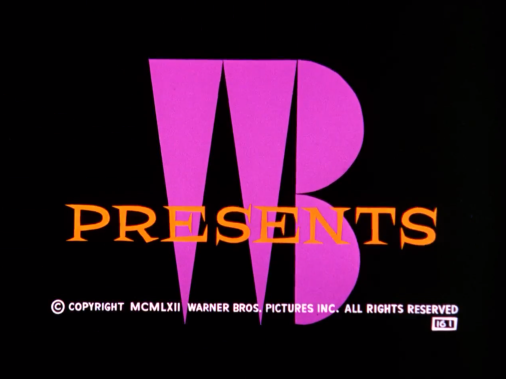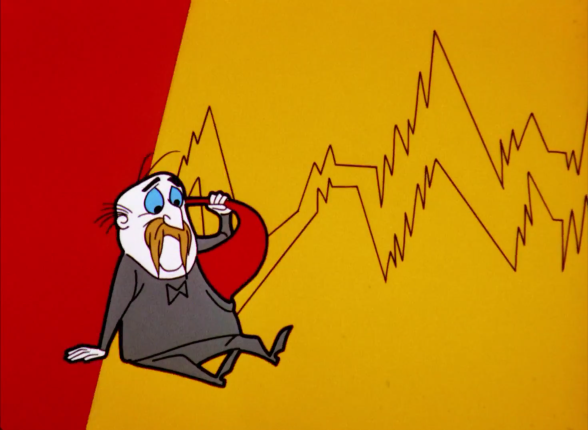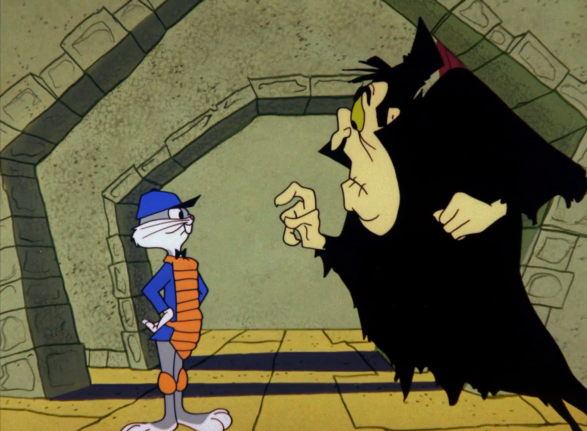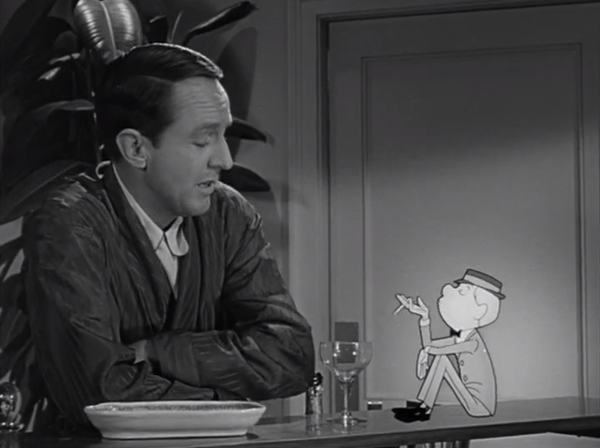1963: Abracapocus!
Another year with many WB cartoon shorts... and another failed TV pilot getting a new life in theaters.
I Was a Teenage Thumb
Directed by Chuck Jones, Esq.
Co-director: Maurice Noble
A new take on the story of Tom Thumb. George Ebenezer and Prunhilda Thumb haven't had a baby despite Prunhilda's wishes. Just when she says she'd like to have one, even one the size of her thumb, magician Ralph K. Merlin Jr. happens to walk past and grants her wish. But one night a cat snatches the baby, starting a weird series of events. While I like the visuals and there are a couple of good lines, I find this one of Jones' weaker efforts. He's had a lot funnier and more interesting – in fact, despite the unpopularity of Jones' early cartoons, his more serious, Disney-esque version "Tom Thumb in Trouble" (1940) was more to my liking. Quite forgettable, though I appreciate Jones experimenting.
7
Devil's Feud Cake
Directed by Friz Freleng
Sam hijacks a plane and forces Bugs to fly it, jumping out when they're about to crash. But he dies after crashing into the ground, having not had a parachute. He ends up in Hell, but the devil gives him another chance if he catches Bugs and makes him take his place. Possibly the ultimate cheater cartoon: not only are Sam's attempts to catch Bugs (which constitute the majority of the short) taken from earlier cartoons, but the story and most of the "new" sequences are actually from The Bugs Bunny Show episode "Satan's Waitin'" (Sam falling from the sky apparently being the only all new content – a short having only ten seconds of new material is pathetic, to be honest). While I haven't seen that episode in full, I imagine it worked a lot better there, with the use of older cartoons being the norm on the TV show rather than an obvious cost cutting method. As a Merrie Melodies short, it's just lazy and underwhelming – shame, since the story had potential and the ending is a genuinely funny one.
6
Fast Buck Duck
Directed by Robert McKimson
Co-director: Ted Bonnicksen
Daffy sees a newspaper ad where a millionaire is looking for a boon companion. He immediately goes to apply, but getting past the bulldog Percy proves to be very difficult. Despite Daffy's greed being the catalyst here, it plays a surprisingly small part in the plot – the wacky antics with the dog are the main thing. Percy's clever reactions to Daffy's attempts are fun to watch – classic WB cartoon gags, really, with some of them having rather unexpected twists. The only short co-directed by Bonnicksen, who had been an animator for the Freleng and McKimson units since 1954 – McKimson relied a lot less on co-directors than Freleng and Jones did at this point. Some of the animation here is surprisingly wacky and lively for the time, I wonder if that was Bonnicksen's influence. A very nice one after a couple of weak entries!
9
The Million Hare
Directed by Robert McKimson
And the second McKimson cartoon in a row with Daffy's attempts to get rich! Daffy is visiting Bugs on his vacation and watching TV. The duo gets picked to participate on the TV show "Beat Your Buddy" – they race to the studio, with the first there winning a million dollars. Daffy tries to sabotage Bugs' attempts but ends up harming his own chances more. Maybe not the most imaginative cartoon in the series, but definitely a fun one! The rivalry between Bugs and Daffy was something the crew always took good advantage of, and Bugs in particular is portrayed well with some good lines. The twist ending is something that always stuck in my mind! An underrated short.
9
Mexican Cat Dance
Directed by Friz Freleng
Everyone is taking a siesta, so the mice take over the bullfight arena, with Speedy Gonzales fighting Sylvester bullfight style. Continuing the recent trend of reusing more and more footage, this short starts with a rather lengthy clip from "Bully for Bugs". And that's where we get to the main problem of the cartoon: the bullfight theme was done much better before, that cartoon being the greatest example. A bullfight with a cat and a mouse is a twist... but while Bugs had plenty of great dialogue during his bullfight, Speedy is mostly relegated to shouting his catchphrases over and over, supported by a bunch of annoying ceaselessly laughing mice. The gags themselves fare slightly better, though they are fairly ordinary cat and mouse stuff. Add some lazy animation (characters speaking without their mouths moving in several scenes) and you don't have one of the characters' finest moments.
6.5


Now Hear This
Directed by Chuck Jones
Co-director: Maurice Noble
The devil has lost one of his horns and is looking for it. An old British man happens to find it and throws away his old ear trumpet, using the new horn instead. He experiences various strange phenomena. What a weird cartoon! Surreal visuals accompanied by equally odd sound effects – a tribute to Treg Brown, the creator of the various brilliant sounds used in the WB cartoons for several decades. While the cartoon is essentially six minutes of randomness, it's one you can't accuse of being predictable or derivative! Enjoyable in all its surrealism – I'll definitely take something like this over some of the other shorts we've had this year... The last Warner Bros. cartoon short to be nominated for an Oscar (for 1962), which it lost to Storyboard's "The Hole" – the Academy again showed their eccentric tastes with the nominees. Additionally, this short introduced a new set of opening and closing titles with abstract visuals and a strange arrangement of the Looney Tunes theme – these would be used in the studio's remaining one-shot cartoons ("Bartholomew versus the Wheel" and "Señorella and the Glass Huarache"), but they would find a more significant use later on...
8.5
Woolen Under Where
Directed by Phil Monroe & Richard Thompson
Another day at work for Sam Sheepdog and Ralph Wolf. Though it seems to be a bit of a clumsy day for Sam, he still easily outwits the wolf despite his attempts to sneak under the grass, unicycle and dive. This was the last appearance of Ralph and Sam. We get the usual schtick with them being friendly towards each other when not working, but there's some new stuff too, like the combination of various contraptions Ralph tries to use at the end to get rid of the sheepdog once and for all. Also the first theatrical cartoon directed by Monroe and Thompson (in fact the only one by Thompson), taking over for the fired Chuck Jones. Both had been animators in Jones' unit for years, with Monroe also having previously directed TV commercials at the studio. It still very much feels like a Jones short, which is not a surprise, as he had contributed the story before leaving. The cartoon has nice visuals too, with written sound effects and an interesting transition between scenes at one point! A worthy sendoff for the only employed rivals in the series!
9.5
Hare-Breadth Hurry
Directed by Chuck Jones
Co-director: Maurice Noble
Wile E. Coyote appears to be chasing the Road Runner once again... but it turns out the Road Runner has sprained a giblet, forcing Bugs Bunny to take his place! Apart from fittingly replacing the bird seed with carrots, the coyote tries to catch him using the usual methods, including boulders, guns and anvils. The last of the Bugs and Wile E. pairings is very different from the others – owing to the plot, the coyote is mute, while Bugs makes various humorous comments throughout. While I don't think it quite lives up to those earlier shorts, there are some entertaining gags, and you can't deny the idea is an imaginative one! A fun one that's a lot better than I remembered.
8.5
Banty Raids
Directed by Robert McKimson
A little beatnik rooster shows up near the barnyard, having been kicked out of another one for his loud rock music. He immediately charms the hens with his beat music, but to get there, he has to get past Foghorn first. A baby disguise is the solution... After a couple of weak Foghorn entries, what a return to form this is! The banty rooster with his ridiculous hip 60s slang and cool personality is the absolute standout character, Foghorn and the Barnyard Dawg also faring well in their typical roles. The rock-influenced soundtrack is also great, including the beatnik's brief rendition of Frankie Avalon's "Gee Whiz - Whilikins - Golly Gee" (earlier performed by Bugs on episode 6 of "The Bugs Bunny Show"). Strong timing, enjoyable gags with a great ending! This was Foghorn's last cartoon in a lead role, though he would make a cameo appearance the following year... And as bleak as things may have looked, he and the Dawg got a very strong sendoff!
10
Chili Weather
Directed by Friz Freleng
Sylvester is guarding a food processing plant, preventing the mice from getting any food. But thankfully, Speedy Gonzales arrives and gets them the food they need, leading to a cat and mouse chase inside the factory. A fun one – the plot is pretty much the most common one for a Speedy cartoon, but the action taking place inside the factory itself is new. Speedy returns to being more of a trickster with some of his ways to outwit the cat. Nothing revolutionary but a very well made chase cartoon in any case.
9
The Unmentionables
Directed by Friz Freleng
In the roaring 20s, gangsters run amok, forcing someone familiar with the underworld to take on them: agent Elegant Mess (Bugs Bunny). Mess ends up in trouble with Rocky and his gang, but he uses his wits to defeat them. Rocky and Mugsy are always fun, and this cartoon is no exception. Bugs' usual cleverness and great gags (including a surprise ending) make this a very entertaining short even without being familiar with the show being parodied here ("The Untouchables").
9.5
Aqua Duck
Directed by Robert McKimson
Daffy is in the desert and needs water. He soon finds a hunk of gold, but a packrat offers to trade it for water, which the greedy duck doesn't want to do. For a cartoon all about a character's hallucinations in the desert, this is surprisingly entertaining! This allows for some of the wackiest Daffy moments in years, thus combining the duck's earlier and later portrayals in the same cartoon. The packrat is also amusing with his constant appearances, and the last gag is both funny and surprising!
8.5
Mad as a Mars Hare
Directed by Chuck Jones
Co-director: Maurice Noble
Marvin the Martian is observing the Earth when a rocket lands on Mars, crashing into him. Astrorabbit Bugs is on a mission to claim the planet for the Earth. The rabbit's unwillingness is quickly changed with the lure of a carrot, and he soon meets an angry Marvin... Some fun moments with Bugs and Marvin, but I definitely find this the weakest of the Martian's appearances – as enjoyable as their shared scenes are, it takes five minutes for the two to meet, and the scenes before that are much less remarkable. Better pacing would have worked wonders here.
8
Claws in the Lease
Directed by Robert McKimson
Sylvester and his son are living in a dump, struggling to find food. Junior goes looking for a home and immediately finds one, but the woman living there doesn't want to let his father in despite various attempts. Another good effort with the cat duo, both of them having great moments (Sylvester's attempts are funny, especially him singing a cat food commercial jingle, with Junior being adorable and having some good lines). The woman isn't quite as memorable a character, but her brutish personality makes her an entertaining foil for Sylvester.
8.5

Transylvania 6-5000
Directed by Chuck Jones
Co-director: Maurice Noble
Bugs tries to travel to Pennsylvania but ends up in Transylvania instead. He goes to Count Bloodcount's castle, mistaking it for a motel, looking for a telephone. The vampire plans to feast on the rabbit's blood, but Bugs happens to discover a book of magic words. Jones' last Bugs cartoon in the classic era is one of his best. The scene with Bugs and Count Bloodcount using the magic words is one of the most memorable in this era, featuring some brilliant gags. Bugs' personality is captured here wonderfully, regardless of whether he's unaware of his surroundings or cleverly outwitting a vampire. While he's the definite star, the vampire is an entertaining foil for him – and while Count Bloodcount only made one appearance in the classic cartoons (I imagine that wouldn't have been the case if Jones had kept working on the series), he would return in many of the later revivals. One of the last real Bugs Bunny classics!
10
To Beep or Not to Beep
Directed by Chuck Jones
Co-director: Maurice Noble
Wile E. Coyote is again chasing the Road Runner, using the likes of a rope, a wrecking ball, and in an extended gag, a catapult. Continuing the recent trend of cartoons reusing old footage, this cartoon is almost entirely taken from the previous year's "Adventures of the Road-Runner", with Bill Lava's music replacing Milt Franklyn's original score, and a new opening and ending (both of them essentially different versions of scenes used in the original featurette). Having seen the featurette, it feels rather lazy, but I think it's more acceptable than the average cheater cartoon: the featurette had had a very short theatrical run, meaning that the audience was even less likely than usual to have seen the original. Some of the novelty of the featurette is lost, as none of the scenes with the coyote speaking made it here, but the catapult scene was definitely among the most memorable in the film. No Latin names for either character, just like in the full version. Enjoyable but highly derivative – and this isn't the last time the featurette would be used to create "new" cartoons...
8
WB also planned a TV comedy show combining live-action and animation called "The Wonderful World of Philbert". The pilot episode (originally titled "Three's a Crowd") was rejected by networks. However, like the Road Runner pilot the year before, it got a theatrical release, with some changes including removing the laugh track.

Philbert
Directed by Richard D. Donner
Animation Director: Friz Freleng
Animation Co-directors: Hawley Pratt & Gerry Chiniquy
Griff, a cartoonist, interacts with his creation, the character Philbert, who has somehow come to life. While trying to come up with gags for the next comic strip, Griff tells Philbert his girlfriend Angela is coming to dinner. Philbert is immediately suspicious of her and decides to wreak havoc both before and during their date, also getting Griff's pet dog Hap involved. What would otherwise be a fairly ordinary comedy gets some appealing flavor from the animation/live-action combination. The chemistry between the cartoonist and his character is enjoyable, with Philbert's spiky comments and sneaky schemes. The interaction between the actors and animation might be the best we've seen since "You Ought to Be in Pictures" – I like how Philbert uses various real-life objects as instruments or otherwise manipulates them (especially during the theme song). While not an all-time classic, I think this could have made for an entertaining sitcom series with its unique animated elements.
8.5
The early 60s are often considered the period when the Looney Tunes and Merrie Melodies started declining in quality, and indeed, this year feels like a mixed bag at times. There were some very good cartoons in the bunch, but the start of the year was one of the weakest in the studio's history. Freleng and Jones made some good cartoons, but also some of their weakest – Jones at his most experimental could be hit and miss (though I appreciate his attempts to try something new), while Freleng had a couple of very lazy cartoons recycling old footage. McKimson surprisingly fared best out of the main directors, his cartoons being consistently enjoyable.
-
 3
3
-
 1
1



4 Comments
Recommended Comments
Create an account or sign in to comment
You need to be a member in order to leave a comment
Create an account
Sign up for a new account in our community. It's easy!
Join the herd!Sign in
Already have an account? Sign in here.
Sign In Now